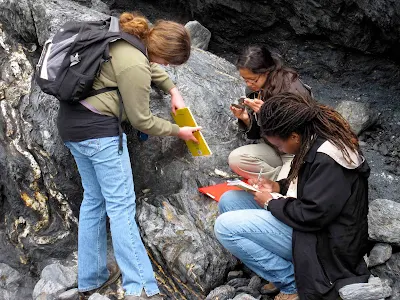What Makes Geology Different From Other Sciences?
 |
| What Makes Geology Different From Other Sciences? |
Who are Geologists and Geoscientists?
They are people like you who are interested in doing something positive for their community and the planet! A geoscientist studies the earth, including its composition, physical aspects, and the relationship of human activities to our planet.A geoscientist's work might involve searching for natural resources like groundwater, metals and petroleum, or studying potential hazards like earthquakes, tsunamis, volcanic eruptions, and landslides.
A geoscientist may help environmental scientists clean up and preserve the environment. Someone working in this field may also be called a geologist, earth scientist, environmental scientist, or geophysicist.
Look at the headlines in the news and you are likely to see CLIMATE CHANGE, EARTHQUAKE or other natural disaster, OIL and earth resources. Geoscientists work on these and other important problems of our times. Become a geoscientist and become part of the solution!
Most geoscientists spend a lot of time in the field! Geoscience jobs may involve mapping rock units, faults, landslides and other earth features. Some geoscientists are involved with monitoring earth phenomena such as earthquakes, volcanoes, river levels and ground water. Geoscience is one of the few careers where you can guarantee at least some of your time is not spent in an office or behind a computer.
In these trying economic times, geoscience is one of the bright areas on the employment scene. Geoscientists are in demand at the local, national and international levels. In California, no development can proceed without the input of geoscientists who look at impacts of faults, hillslopes, contamination, and other potential problems. Geoscientists are the backbone of resource exploration and development. Geoscientists who study earth’s past climate are an essential part of the global warming debate.
10 reasons Geologists make good partners
